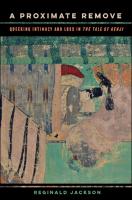A Proximate Remove
Queering Intimacy and Loss in The Tale of Genji
Abstract
How might queer theory transform our interpretations of medieval Japanese literature and how might this literature reorient the assumptions, priorities, and critical practices of queer theory? Through a close reading of The Tale of Genji, an eleventh-century text that depicts the lifestyles of aristocrats during the Heian period, A Proximate Remove explores this question by mapping the destabilizing aesthetic, affective, and phenomenological dimensions of experiencing intimacy and loss. The spatiotemporal fissures Reginald Jackson calls “proximate removes” suspend belief in prevailing structures. Beyond issues of sexuality, Genji queers in its reluctance to romanticize or reproduce a flawed social order. An understanding of this hesitation enhances how we engage with premodern texts and how we question contemporary disciplinary stances. “A brave and groundbreaking work. Jackson’s queer reading of The Tale of Genji— where ‘queer’ does not index a particular sexual identity or mode of erotic exchange but, rather, provides a provocative critical lens—throws into sharp relief practices of Heian sexual politics. Intimately researched and engagingly written.” CHARLOTTE EUBANKS, author of Miracles of Book and Body: Buddhist Textual Culture and Medieval Japan “A Proximate Remove offers a bold and provocative reading of the eleventh-century classic The Tale of Genji. It begins the much-needed task of exposing the ideological limitations that define the parameters of existing premodern Japanese studies.” ATSUKO UEDA, author of Language, Nation, Race: Linguistic Reform in Meiji Japan (1868–1912)
Keywords
Asian Studies; Queer TheoryDOI
10.1525/luminos.106ISBN
9780520382558, 9780520382541, 9780520382558Publisher
University of California PressPublisher website
https://www.ucpress.edu/Publication date and place
Oakland, 2021Imprint
University of California PressClassification
Ethnic studies
Theory of art


 Download
Download Web Shop
Web Shop